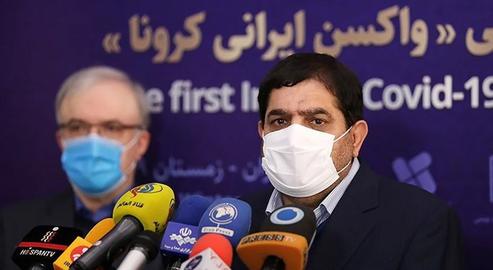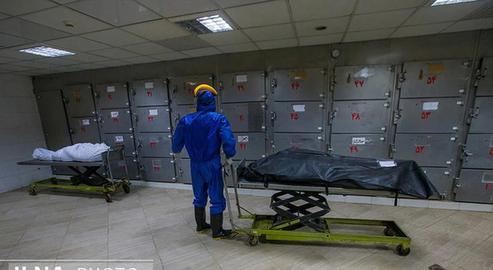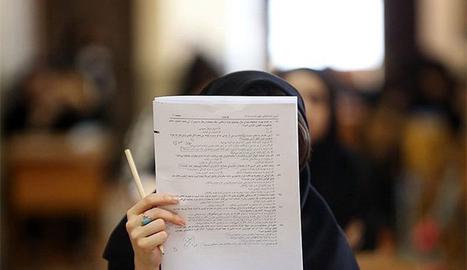A new report by the Center for Strategic Studies, the research arm of the Iranian president’s office, has castigated Iran’s official response to the threat of coronavirus. The government of the Islamic Republic, it says, acted inefficiently and unsuccessfully in the face of the threat posed by Covid-19.
Pointing out that Iran is one of the worst-hit countries in terms of SARS-CoV-2 infections and deaths in the Middle East and Asia, the report, entitled Capacity of Governments in Responding to the Coronavirus Crisis, declares that currently about 20 percent of daily registered deaths in Iran are linked to Covid-19 – and that this is the direct result of the way the government handled the epidemic over the course of last year.
It examines the initial responses of different countries around the world to the crisis and surmises that other factors, such as genetics, health infrastructure and cultural, political, social and economic concerns should not play a major role in the management of the virus in any state.
"Among the countries that have successfully dealt with the pandemic,” it notes, “we find no country other than China that has spent a lot of time on denying the crisis, or on indecision and procrastination.”
The report fails to mention the Islamic Republic here but in other sections, the performance of Iran’s government is implicitly criticized. From the very beginning the Iranian state sought to deny the existence of Covid-19 in Qom, leading the virus to spread rapidly to adjacent cities and across the country. Disinformation has marked every stage of the response, as well as clearly under-reported cases and deaths from Covid-19 and competing claims by the IRGC, the clergy, politicians, the Supreme Leader and other parties about the nature of the virus and Iran’s plans for a vaccine.
"The main factor influencing the success or failure of countries in managing the coronavirus crisis is the governance practices," the think-tank observed. “All other factors, including the type of state, countries’ financial and technological capabilities and the public attitude, can only play a significant role if they were within the framework of a suitable governance model for the crisis."
The report goes on to name "strategic dichotomies in crisis management" as one of the most important factors in the spread of coronavirus in Iran and the high death rate.
The study goes on to identify some of the most important characteristics of a successful response to a contagious disease outbreak. These include “sufficient courage and realism to accept the depth and scope of the crisis, and sufficient will to act swiftly and decisively, even when this action might be against political interests".
The government of the Islamic Republic exhibited the precise opposite of the behaviour during the early outbreak of coronavirus. Instead, the crisis was politicized and stifled.
The Center for Strategic Studies goes on to declare another important quality is "respect for scientific evidence, and basing all decisions and interventions on such evidence." This has similarly posed a problem in Iran, where the tussle between proponents of traditional Shia medicine and modern medical science clouded Iran’s ability to deal with the disease.
The report adds that "pragmatism" on the part of governments, combined with "a considerable degree of empathy, transparency, and honesty", led to “public trust”: an important factor in effective epidemic response. Again, this was not achieved in Iran and if anything, the official response has deepened public distrust of the government and made people less likely to follow the guidance. Some other countries, the report notes, have been able to “partially rebuild” from a lack of trust the leadership during Covid-19 but this has not occurred in Iran.
Finally, the report states, “Successful leaders sought to make the coronavirus crisis a cause of solidarity and connection in their country, not a cause of rupture.... [and] spoke neither of the enemy nor of a conspiracy, nor of political exploitation of their rivals, and considered the main enemy to be the virus itself and the pandemic, defining their mission as protecting their people against the economic, social, and psychological consequences of the crisis."
The unsuccessful countries, it said, were those that did not “learn” but “considered themselves isolated and transcendent of the laws and rules of nature.”
“The performance of the Iranian regime during the coronavirus crisis,” it goes on, “was not only unacceptable, but in many respects was poor even among the countries of this region. We have one of the highest death tolls in Asia and the highest death toll in the region; we fell behind in the number of tests taken compared to many countries in the region; and we were very fragmented, weak, and sometimes even incapable of policy-making, decision-making and implementation.
"Iran's governing apparatus did not score well in any of the characteristics mentioned for successful countries in crisis. This indicates the need for a fundamental reconsideration of the mode of governance."
The report goes on to offer some possible ways of reconfiguring governance in the country. First, it states: “Crises must be recognized, accepted and thought about. Denying crises does not destroy them; it turns them into a catastrophe. Coronavirus has shown that the government in Iran is suffering from at least four relatively stable and long-term issues.” These are respectively listed as decision-making, public trust, political cohesion and “capability”.
"At the national level,” the report states, “coronavirus has proven that the government in Iran, despite its large scope and multitude of personnel, is very weak and inefficient.” A policy of “empowerment”, it says, must be pursued to improve the situation – as must the lifting of international sanctions on the country as soon as possible.



























comments